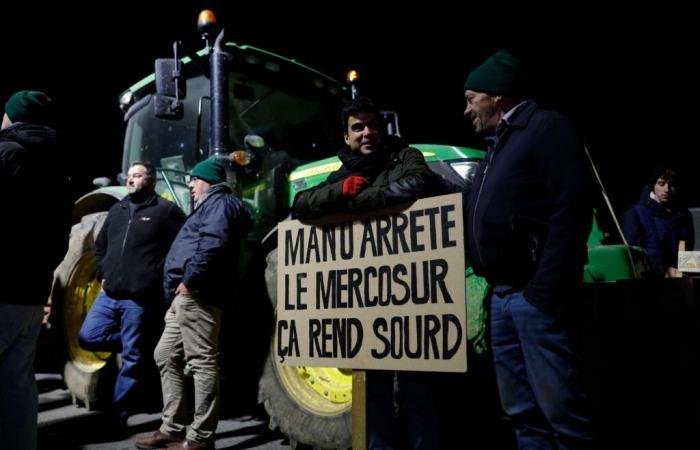
Mal putting out a fire exposes you to the risk of it starting again. At the start of 2024, the agricultural crisis had been resolved, as best it could, on promises and ambiguities. As some remained pending and others had not been lifted, peasant anger once again threatened to be heard, from November 18, throughout the territory. To the unsatisfied grievances of spring and the devastating effects of climate change on crops was added a powerfully unifying subject: the imminent conclusion of the free trade agreement between the European Union (EU) and the Mercosur countries ( Brazil, Argentina, Uruguay, Paraguay and Bolivia).
Read also | Live, farmers' anger: follow the situation on the ground and ask your questions
Read later
This treaty, negotiated for nearly twenty-five years, constitutes a source of favorable opportunities for European industry, dairy products and alcohol while securing protected geographical indications on many food products. On the other hand, for cattle breeders, poultry breeders and cereal growers, the free trade agreement is a pushback which would weaken sectors that are already in bad shape. In addition to an increase in export quotas, these sectors denounce the risk of being subjected to unfair competition which could accelerate the decline of French agriculture.
Little echo on the European level
There is no shortage of reasons to criticize this agreement. In a column published in The World600 parliamentarians underline its incompatibility with the 2015 Paris climate agreement, particularly in terms of deforestation. In the absence of adequate controls on imported products, it exposes French agriculture to competition whose production methods are much less demanding from a regulatory standpoint, whether for the use of pesticides and hormones or for respect for the good. -be animal. Above all, the agreement highlights competitiveness gaps that are difficult to overcome for a French model characterized by smaller farms. Parliamentarians are finally warning that the security of our agricultural supplies is being called into question.
While the French political class is more divided than ever, the refusal of the Mercosur agreement is the subject of an unusual consensus, from the National Assembly to the government including the President of the Republic. Under the pressure of agricultural anger which can no longer be appeased, everyone proclaims loud and clear that the treaty is not acceptable “as is”. But this unanimity finds little echo on the European level, where France is struggling to rally to its cause the blocking minority which would allow the text to be suspended.
Read also | Article reserved for our subscribers EU-Mercosur agreement: France is worried, the European Commission believes in it
Read later
Most member states believe, on the contrary, that it would be dangerous to abandon this agreement at a time when, after the election of Donald Trump, the protectionist temptation is taking hold of the United States, while China is ready to take advantage of the procrastination of the Twenty-Seven to strengthen its positions in South America. Does Europe, which seeks to assert itself as a power in a world that is increasingly hostile to it, have the means to deprive itself of new commercial outlets?
Weakened by an agricultural model that is running out of steam and paralyzed by the prospect of a social crisis at the worst possible moment, France hardly has the means to influence the debate. If Brussels decided to ignore Paris' advice, this would mark an unprecedented decline in France's weight in Europe. Even more serious, the episode risks leaving a harmful and lasting mark on French opinion by fueling anti-EU sentiment.





